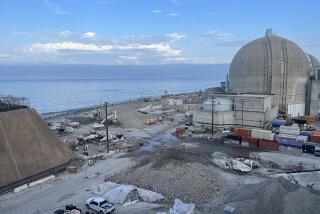Costly Nuclear Waste Facility May Never Work, Report Says
- Share via
AUGUSTA, Ga. — The multibillion-dollar facility where nuclear defense waste is to be stored is years behind schedule and may never work when it is completed, a federal report says.
The Defense Waste Processing Facility at Savannah River Site once was scheduled to become operational in 1990. But it will not be ready before 1994, and maybe not even then, according to the General Accounting Office report released Friday.
“Further delays are possible because of technical issues and other uncertainties,” the GAO said. Poor management by the federal Energy Department and its private contractors was blamed.
“Much of the cost growth and schedule slippages resulted from ineffective DWPF management,” said the GAO, adding that the problems may keep the project from being completed.
Savannah River Site officials said GAO investigators did not consider that the plant’s technology is new and that changes in the project have had to be made in the 10 years since construction began.
The facility is located on the government’s Savannah River Site in Aiken, S.C., across the Savannah River from Augusta. The Energy Department has so far spent $1.8 billion on it and could end up spending $4 billion, the GAO said.
Some of the world’s most radioactive waste, currently stored in 51 underground tanks at the Savannah River Site, is eventually to be stored permanently in the facility.
Nine of those tanks have leaked and some contamination from one tank has reached the soil, although the contamination apparently is not moving.
Without the Defense Waste Processing Facility, new tanks eventually would have to be built and the waste monitored for thousands of years, officials say. Or the whole program might have to be scrapped and some new permanent storage technology developed.
“Tanks are a temporary storage mechanism,” said Brian Costner, director of the Energy Research Foundation, an environmental watchdog group. “That’s why we have always viewed the efforts to solidify the high-level waste as critical because it provides a long-term storage regime.”
The GAO report was ordered by Rep. Mike Synar (D-Okla.), a critic of the Savannah site. The GAO is Congress’ watchdog agency.
“The GAO report gives us something that DOE has failed to do, namely a complete picture of all of the problems involved in processing the high-level waste at Savannah River,” Synar said.
More to Read
Sign up for Essential California
The most important California stories and recommendations in your inbox every morning.
You may occasionally receive promotional content from the Los Angeles Times.












